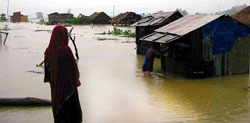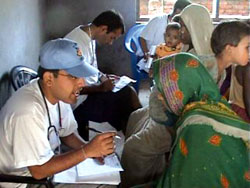|
|
When the floods devastated Banke and Bardiya, Godavari Alumni Association and West-East Youth Volunteer Organisation Nepal, a recently established NGO, decided at an emergency meeting to send medical relief to the worst-affected areas. I, along with 17 other young volunteers and 10 medical doctors, some fresh from school, eagerly volunteered.
We left on 11 September, bombarded with warnings about landslides and highway closures, as well as fears of dacoits, Maoists, and political unrest. It took us 20 hours to reach Nepalganj instead of the usual 12 because of traffic jams caused by landslides, detours, and a flat tyre.
From Nepalganj we got on another bus, crossed the Rapti on a boat shared with bicycles and two dozen other people. A half-finished bridge stood silently across the river. On the other side, we loaded our supplies into three waiting bullock carts and literally set off into the unknown.
As darkness fell we found ourselves walking through the jungle, passing the occasional village and struggling to keep everyone together. We reached Gangapur after midnight, and were welcomed by a few sleepy policemen stationed at the local government health post to assist with relief efforts. Tired, hungry, and thirsty, we slept on a cement rooftop under the starry tarai night.
The local health post was large, with two buildings. The two-storied front building had been converted into living quarters for the policemen, and the five rooms of the single-storied back one were to be our health camp by day, its roof our beds by night.
|
|
| Despair and hope: Over 36 hours of continuous rain flooded Banke and Bardia in the first week of September (left). Volunteer doctors treating flood victims in Gangapur |
Over the course of the day, our doctors saw about 1,700 people from four surrounding VDCs. While registering patients, examining them, and dispensing drugs, one of our biggest problem in this Awadhi-speaking area was the language barrier. It was difficult making sure they understood instructions about medicine dosages and timings. Several of them didn't know their age, or had trouble describing their medical problems. Many of the children were acutely malnourished, and the adults often asked for something to "make them strong". Poverty and poor hygiene were also rampant, and those were problems that had been around long before the flood.
A villager, echoing what others including the police and the Maoists had already tols us, said, "This is the first time any organisation has come to our aid in such a large scale, bringing doctors and medicines along."
Despite the heat and communication problems, when the camp ended after 10 hours, the doctors had examined everyone they could, with many people vowing to return or tell others to come.
The next day when we woke up on the rooftop to the rising sun and the green fields, we immediately started packing and loading our remaining supplies into a tractor, the best vehicle for the terrain. As we started moving, villagers followed us asking us not to leave, telling us that we had to do more. Some even tried to block the road in places. Our hearts went out to them, but we simply didn't have enough time or supplies to help everybody.
Our experience had brought us face to face with the stark reality of our country. The underlying poverty and underdevelopment we had all heard about but never really seen hit us hard. We may not have made huge changes in the lives of the people we helped, but we did what we could.




